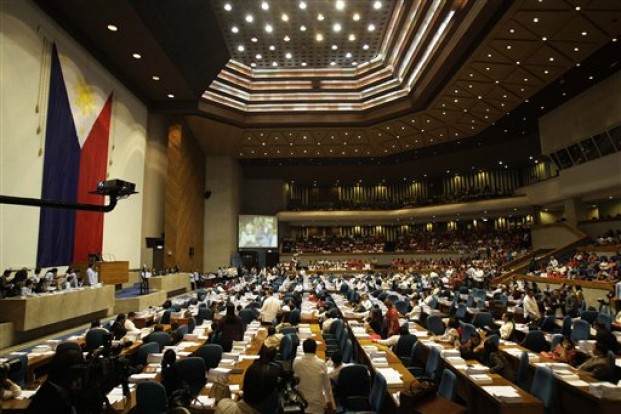House urges enterprises to join ILP
MANILA, Philippines—The House of Representatives seeks to encourage firms to participate in the Interruptible Load Program (ILP) as the main solution to address the expected power reserve shortage in 2015, according to the draft resolution granting President Benigno Aquino III emergency powers.
The resolution said “additional generating capacity shall be preferentially sourced from the ILP, fast tracking of committed projects, and plants for interconnection.”
The provision and procurement of additional generation capacity will be available on or before March 1, 2015, the resolution said.
The ILP is seen by the House energy committee as the preferential solution to the anticipated power reserve shortage supposedly due to the looming El Nino phenomenon, the maintenance shutdown of the Malampaya power plan, increased or continuing outages of power plants, and the delay in commissioning of committed power projects.
The resolution excluded its original plan of purchasing and leasing generator sets, which would have cost P9 billion and P6 billion, respectively.
Under the ILP, big industrial and commercial customers who have the ability to produce their own electricity through generating sets should cut off or reduce their supplied electricity, particularly during peak periods of the day, and instead use their own generator sets.
Article continues after this advertisementThis is to give way for other customers who may need the power than the commercial users. The businesses are also required to contribute their excess energy reserves.
Article continues after this advertisementBut the program is only voluntary, and thus the government cannot compel businesses to participate.
In a press conference on Tuesday, House energy panel chair Oriental Mindoro Rep. Reynaldo Umali said they are leaning towards subsidizing the program to allow more businesses to participate.
Umali said under the ILP, the government would need to shell out an estimated P80 million subsidy in the five summer months to address the anticipated one-hour rotating brownouts once a week.
This is better off than the P200 million needed to address the original outlook of three to five-hour brownouts in five days a week.
The draft resolution also cited an adoption and execution of energy efficiency and conservation measures as a “fallback mechanism.”
According to the resolution, private entities with self-generating facilities are encouraged to participate voluntarily in the ILP on or before December 2014 to stimulate additional generation capacities
Government is also expected to reimburse the business owners of these generators for fuel expenses and “reasonable recover for their use,” the resolution said, adding that the reimbursement will not be subject to value-added tax.
Those businesses which have not registered under the ILP may also be manually deloaded from the grid without compensation “to meet the exigencies of the power shortage,” the resolution added.
To ensure the timely commissioning of additional generation capacities, all national government agencies and local government units are authorized to suspend operability of certain laws such as the Biofuels Act, Clean Air Act, Philippine Grid Code among others,
All government offices are also expected to retrofit their offices and buildings with energy efficient LED bulbs, air-conditioning units with inverters, and solar energy systems.
Energy Secretary Jericho Petilla had called on Congress to approve a resolution granting President Aquino emergency powers to contract additional capacity supposedly to address power shortage in 2015.
But energy officials, not including Petilla, admitted in a House committee hearing on Monday that there would be no acute power shortage, but a 700 megawatt (MW) shortfall which translates to about one-hour power outages every week from March to July 2015.
This is a far cry from the originally anticipated 1,200 MW shortfall resulting in eight hours a week brownouts.
President Aquino is eyeing additional authority to contract power as granted to him by the Electric Power Industry Reform Act (Epira).
RELATED STORIES
To grant or not to grant is not the question
